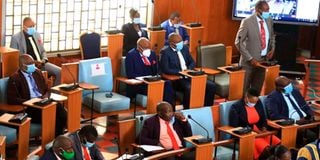Uhuru, Raila target plebiscite after county assemblies win

MCAs debate the BBI report at the Nyeri County Assembly on February 23, 2021.
Allies of President Uhuru Kenyatta and Orange Democratic Movement (ODM) party leader Raila Odinga were Tuesday gearing up for nationwide referendum campaigns.
And, setting the tone for the rallies, Mr Odinga yesterday praised county assemblies for pushing back on a “year-long campaign of lies,” comments seen as targeting Deputy President William Ruto who has termed Building Bridges Initiative (BBI) a non-priority.
The BBI promoters Tuesday secured a referendum after more than 24 county assemblies endorsed the BBI Constitution of Kenya (Amendment) Bill, 2020.
Targeting a referendum by early June, the BBI secretariat has asked Parliament to speed up the process, with the team calling for the introduction of the Bill in the two houses “as soon as possible.”
‘Super Tuesday’
Dubbed ‘Super Tuesday’, the day saw a record 26 assemblies endorse the document, joining 12 other regional houses who had given their nod and paving the way for what would be the first amendment to the 2010 Constitution. Mr Odinga, whose Handshake with President Kenyatta in March 2018 gave birth to the BBI process, yesterday hailed the development as the reaffirmation and renewal of his faith in Kenyans’ ability to “recognise and seize moments of change.”
“I thank MCAs and our governors, who refused to give in to mistrust, cynicism, brinkmanship and fearmongering,” Mr Odinga said in a statement last evening.
By Tuesday evening, Siaya, Homa Bay, Kisumu, Busia, West Pokot, Trans Nzoia, Kajiado, Kisii, Vihiga, Nairobi, Laikipia, Samburu, Kakamega, Narok, Nyamira, Taita Taveta, Murang'a, Bungoma, Kitui, Makueni, Nyeri, Lamu, Nyandarua, Kirinyaga, Garissa, Machakos, Mombasa, Nakuru, Meru, Tharaka Nithi, Bomet, Kiambu, Marsabit, Kwale, Migori, Embu, Isiolo and Tana River had endorsed the BBI Bill. Baringo is the only assembly that has rejected the document so far.
As good as confirmed
And, while the Bill will still need to go to the National Assembly and the Senate, the referendum is as good as confirmed since the decision of the bicameral Parliament — whether endorsing or rejecting the document — will still result in a plebiscite, anyway.
This is because the BBI Bill has proposed changes on issues touching on the functions of parliament, the independence of the Judiciary and the Chapter 15 Commissions, as well as the objects, principles and structure of devolved government.
Tuesday, BBI secretariat co-chairman Dennis Waweru was confident that the Bill will be endorsed by Kenyans in a referendum, in the same overwhelming manner as the regional assemblies.
“Our plan is to hold the referendum by early June,” Mr Waweru, who is also the former Dagoretti South MP, told Nation.
While asking Parliament to dispense with the Bill “within the shortest time possible”, he announced countrywide tours to sell the BBI message.
“We have prioritised civic education, distribution of the BBI Bill and other civic education material and targeted outreach among different groups. We will scale up town hall meetings and other citizen engagement forums,” he added.
Ready for changes
Secretariat co-chair Junet Mohamed said support for the BBI, report even in places where the public had been made to believe that it was unpopular, showed Kenyans were ready for the constitutional changes.
Mr Waweru cited the proposed increase in resources to the counties, the Ward Development Fund, and enhanced oversight roles by the county assemblies and the senate as the devolution gains that brought it home for BBI in the regional Houses.
With the legal threshold required to secure a plebiscite to amend the constitution achieved, both houses of Parliament are now free to table the BBI Bill for debate.
And, with the role of the two houses a largely ceremonial one, since their decision cannot alter the need for a referendum after the county assemblies’ nod, BBI supporters want MPs to dispense with it in the shortest time possible, preferably by end of March.
National Assembly Speaker Justin Muturi has already said that the Bill will take as short as three weeks between the time when it is first read, when it goes to the Justice and Legal Affairs Committee for public participation, and its eventual adoption.
Notify President
Once MPs make their decision, the Speakers will notify the President, who will then signal the Independent Electoral and Boundaries Commission (IEBC) to hold a referendum. The commission has 90 days within which to hold a referendum on receipt of the President’s message.
The BBI backers, however, still have to deal with a case in court in which a five-judge Bench has blocked the IEBC from taking any further action towards conducting a BBI referendum until a hearing of petitions before it are heard and determined.
Yesterday, BBI joint secretary Paul Mwangi, who is also part of its legal team, said they were finalising submissions to the case to be submitted this week, before a hearing between March 17 and March 19.





